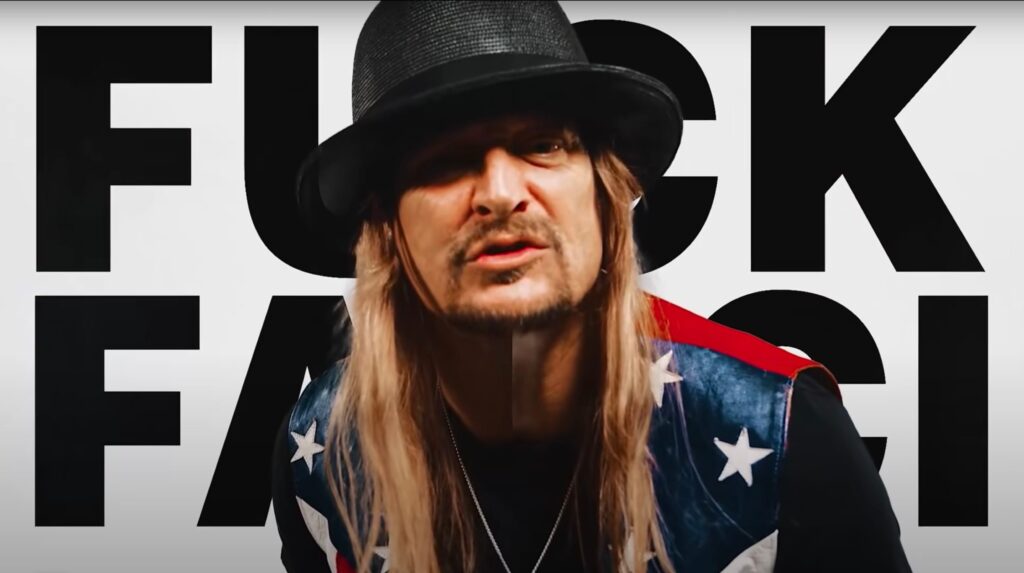- Oliver Anthony's "Rich Men North of Richmond" has been embraced by the MAGA crowd.
- The mournful, spare tune has drawn the ire of some liberals, who have attempted to fact-check it.
- But Oliver Anthony much better than most music pushed by conservative politicians. I'll take him over Kid Rock any day.
To many people, the most significant thing about the viral emergence of folk-country songwriter Oliver Anthony this month wasn't his raw voice or melancholy tunes — it was the character of his newfound fan base.
I first came across the red-bearded Virginian on the feed of fascist-friendly Pizzagate theorist Jack Posobiec, who enthusiastically shared a video of Anthony singing "Rich Men North of Richmond" by saying he couldn't "remember the last time a new song hit me like this."
The song, a backcountry lamentation about obese welfare cheats, taxes, Jeffrey Epstein, and the titular shadowy rich men who seek to control the working man's thoughts, was catnip to the MAGA crowd. Reps. Lauren Boebert and Marjorie Taylor Green hailed it as an anthem for the victims struggling in Joe Biden's America.
Coming on the heels of the wildfire success of Jason Aldean's "Try That In a Small Town" and the QAnon-themed movie "The Sound of Freedom," starring right-wing actor Jim Caveziel, Anthony's popularity seemed to mark a watershed moment for MAGA cultural power.
As if to push back against that moment, critics began to rise up with qualms. The Washington Post worried that "Rich Men" "signals a mainstreaming of ideas that were once fringe." New York magazine subjected it to a comically intense 2,000-word interrogation, summoning economic data and historical analysis to conclude that its "gripes" are "ill-founded." The New York Times' Jamelle Bouie accused Oliver of giving "comfort to those with the boot on his neck."
I share the skepticism of any shiny new bauble being celebrated by the likes of Greene and Boebert. But here's the thing: "Rich Men North of Richmond" is… not bad.
Sure, the fact that Anthony chooses the capital of the Confederacy as the dividing line between the good guys and the bad guys is a red flag.
But as a song, it is simple and unadorned, giving plenty of running room for Anthony's clear baritone, which manages to be sharp and vulnerable at the same time.
Most important, as a songwriter and musician, Anthony is a vast improvement over his peers in the pantheon of celebrated right-wing musicians. That's not saying much, given that the competition is dominated by Ted Nugent and Kid Rock. But whether you think Oliver is Trojan-horsing crypto-racist ideology into the cultural conversation or not, you have to admit that his success represents progress over the dick-banging, posturing schlock that counts as "conservative music" these days.
A glance at Oliver's available online catalog — which almost exclusively consists of solo arrangements, with Oliver accompanying himself with a mournful, unamplified Gretsch resonator guitar — makes clear that he is capable of a level of subtlety and self-awareness that escape the likes of Kid Rock and Nugent. As a songwriter steeped in the Appalachian tradition, Oliver is as concerned with sin, self-doubt, and the struggle to be a good person in a fallen world as he is with tribal politics.
Although "Richmond" is more of a blast of rage than a self-lacerating hymn, its narrator still laments that he is wasting his life away. "I Want to Go Home," which was praised by Sen. Ted Cruz as "a song for our time," is more explicitly melancholy. The narrator is lucky not to be "strung up" in the "psych ward," and finds himself beseeching the lord when he reaches the end of his rope: "I don't know which road to go / It's been so long / I just know I didn't used to wake up feelin' this way / Cussin' myself every damn day."
It feels closer to "I Hate Myself and Want to Die" than "God Bless the USA."
As a songwriter and performer, Oliver is clearly positioning himself as an inheritor to the straight-country tradition of Hank Williams and the Louvin Brothers, whose themes of sorrow, regret, self-doubt, and redemption don't mix well with uncomplicated MAGA triumphalism.
"I Gotta Get Sober" is a slow minor-key waltz with a delightfully tight classic-country chorus: "I've gotta get sober / I've gotta start livin' right / And I don't know how it's gonna go / But it ain't gonna happen tonight."
Likewise, "Cobwebs and Cocaine" doesn't quite sound like walk-on music at the 2024 RNC:
Well my poor old wife, grabbed a shot box of lead
Ran a 410 slug, plum through her head
She said she'd rather be living in hell, than with me instead
And I can't find fault in that
'Cause these cobwebs and cocaine, are the only things left in my brain
I'm shoveling coal, on the midnight train
Headed straight toward the depths of hell
Whether you like it or not, it's hard to deny that these songs — when they are not dog-whistling racists — are wrestling with serious ideas that go way beyond "my suffering is Joe Biden's fault." And they are presented, quite cannily, as the work of a single man and his trusty guitar, out in the woods with a faithful dog at his feet and an old pickup truck in the background.
It's may be a carefully crafted image, but it's an inarguable improvement over the domineering, bombastic, ear- and brain-splitting aesthetic of most explicitly right-wing music.
Contrast it with conservative favorite Kid Rock, whose "We the People" opens with this clever bit of artistry:
We the people
In all we do
Reserve the right
To scream fuck you
The video features Rock, wearing an "American Badass" trucker hat, playing various musical instruments emblazoned with the stars and stripes.

Or Nugent, whose claim to fame is a song about venereal disease exploiting the fact that the female anatomy shares a nickname with a common term for cats. His more recent work includes "Come and Take It," with the lines:
No more kings no tyrants
No more jackboot thugs
We will unleash violence
For the land that we love
So you see, it could be worse.
Anthony released a YouTube video today that sought to pour cold water on the conservative embrace he's enjoyed and making clear that he doesn't stand shoulder-to-shoulder with the GOP politicians that are seizing on his songs.
But I hope that doesn't diminish his popularity among the MAGA set. It's heartening to see someone who's at least trying to write good songs making inroads into what has been a cultural desert. And some of the greatest songwriters of our time have come back from the brink of political hackery.
The great Merle Haggard recovered from co-writing "Okie from Muskogee," which now stands as high-camp hypocrisy about the dangers of marijuana and sandals from a cocaine-addled mind. He wrote some even worse tunes, including "I'm a White Boy," which is what it sounds like and has aged even worse.
But by the time he ended his career, Haggard was the unquestioned poet of the American working man and woman, regarded by the right and the left as a visionary. And in one of the last interviews he gave before he died in April 2016, he expressed what Rolling Stone described as "amusement and concern" over Donald Trump's presidential ambitions.
"I think he's dealing from a strange deck," he told the magazine.










